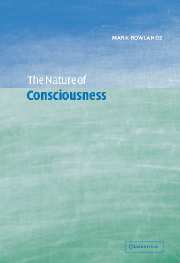Book contents
- Frontmatter
- Contents
- Preface
- 1 The problem of phenomenal consciousness
- 2 Consciousness and supervenience
- 3 The explanatory gap
- 4 Consciousness and higher-order experience
- 5 Consciousness and higher-order thoughts
- 6 The structure of consciousness
- 7 What it is like
- 8 Against objectualism II: mistakes about the way things seem
- 9 Consciousness and representation
- 10 Consciousness and the natural order
- Bibliography
- Index
1 - The problem of phenomenal consciousness
Published online by Cambridge University Press: 22 September 2009
- Frontmatter
- Contents
- Preface
- 1 The problem of phenomenal consciousness
- 2 Consciousness and supervenience
- 3 The explanatory gap
- 4 Consciousness and higher-order experience
- 5 Consciousness and higher-order thoughts
- 6 The structure of consciousness
- 7 What it is like
- 8 Against objectualism II: mistakes about the way things seem
- 9 Consciousness and representation
- 10 Consciousness and the natural order
- Bibliography
- Index
Summary
Consciousness is perceived by many to provide the principal threat to materialist accounts of the mind. This threat has been developed, in somewhat different ways, by a lineage of writers from Nagel (1974) through Jackson (1982, 1986), Levine (1983, 1993) to McGinn (1989, 1991) and Chalmers (1996). While the precise nature of the threat posed by consciousness has tended to vary, the concept of consciousness perceived to underlie this threat has held relatively constant. It is phenomenal consciousness that is considered problematic. There are serious problems, if the authors of the above lineage are correct, involved in finding a place for phenomenal consciousness in the natural order. This book is concerned with these problems, with why they are problems, and with whether these problems admit of a solution.
What is phenomenal conscyiousness?
Any study of phenomenal consciousness faces an immediate problem. There is no perspicuous way of defining the associated concept. That is, there is no non-circular way of specifying the content of the concept of phenomenal consciousness that does not rely on concepts that are equally obscure. Attempts to explain its content, accordingly, tend to rely on a number of devices, linguistic and otherwise.
Examples
Attempts to explain what phenomenal consciousness is often proceed by way of examples: the way things look or sound, the way pain feels, and, more generally, the experiential properties of sensations, feelings and experiences.
- Type
- Chapter
- Information
- The Nature of Consciousness , pp. 1 - 25Publisher: Cambridge University PressPrint publication year: 2001



